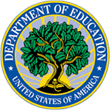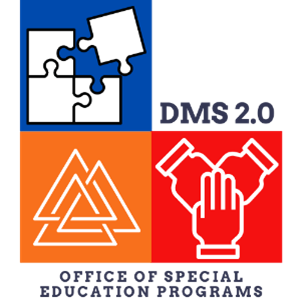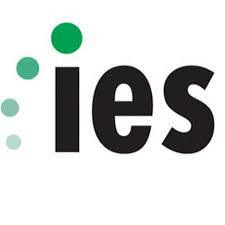In This Issue:
From the Director

Message from Acting OSEP Director, Dr. David Cantrell
Dear Stakeholders!
It has been another busy month at OSEP as we continue to issue resources to support infants, toddlers, children and youth with disabilities and their families. On October 19, 2021, The Department issued a new technical assistance resource entitled “Supporting Child and Student Social, Emotional, Behavioral and Mental Health.” This resource for educators and practitioners is intended to supplement and build on the information in the prior released ED COVID-19 Handbooks. OSEP was the lead principal office in developing the guidance and I am so appreciative of the efforts of OSEP staff over the past six months in getting this resource issued. This resource highlights seven key challenges to providing school or program-based mental health support across early childhood, K–12 schools, and higher education settings, and presents seven corresponding recommendations. This resource includes many real-world examples, including resources from OSEP funded technical assistance centers, of how the recommendations are being put into action by schools, communities, and states across the country.
Additionally, On October 29, 2021, The Department released two new Q&As entitled “Return to School Roadmap: Child Find, Referral, and Eligibility Under Part C of the Individuals with Disabilities Education Act (IDEA)“ and “Return to School Roadmap: Provision of Early Intervention Services for Infants and Toddlers with Disabilities and their Families under Part C of the Individuals with Disabilities Education Act (IDEA)“. These IDEA Part C documents complete OSERS Return to School Roadmap Q&A series. The documents build on the August 24 press release and demonstrate the Department’s continued commitment to support States to ensure they have the information necessary to carry out these important requirements and to make good use of the additional American Rescue Plan (ARP) funds to ensure the full implementation of IDEA requirements.
November is a very special month as we pay honor to our veterans who served our country and for the first time in two years many of us will be able to celebrate Thanksgiving in person with loved ones. Another celebration that occurs between Veterans Day and Thanksgiving is American Education Week. In 1921, well before Veterans Day and its predecessor, Armistice Day, were national holidays, the National Education Association and the American Legion created an awareness campaign supporting public education as 750,000 World War I draftees were rejected from serving as they were unable to read. This year American Education Week will be celebrated on November 15–19. I encourage you to review the link above for suggestions on how to safely celebrate American Education Week.
As we begin the holiday season, the Centers for Disease Control has updated their guidance on Safer Ways to Celebrate Holidays. Staff from OSEP have worked with CDC in developing COVID-19 guidance to that includes considerations for infants, toddlers, children and youth with disabilities and their families and their providers and educators. The CDC updates their guidance regularly and I invite you to subscribe to their email subscription service.
Thank you again for all that you do!
David Cantrell, Ph.D.
Acting Director
Office of Special Education Programs
|
ED Updates

Diversifying the Teaching Field — Web-based Technical Assistance Package
IDRA, which operates IDRA EAC-South (EAC Region II), has developed a technical assistance package with various resources to promote diversity in the teaching profession. The package includes a literature review that examines the current state of teachers of color in the educator workforce, the factors that affect the recruitment, hiring, and retention of teachers of color, and opportunities for growing a stable workforce of teachers of color.
|
Announcements
Technical Assistance (TA) Calls
Next TA Call:
November 18, 2021 at 4:00–5:00pm (EDT)
There will be one November National TA call on DMS 2.0 activities. As part of the Universal TA, the DMS National TA calls will provide guidance on specific puzzle pieces in coordination with our Phase I monitoring activities, or other guidance related to DMS 2.0.
Previous TA Calls:
October 14, 2021 at 4:00–5:00pm (EDT) — SPP/APR
October 28, 2021 at 4:00–5:00pm (EDT) — DMS & IEP Guidance
(All National TA calls are recorded and typically posted within a week)
State Performance Plans / Annual Performance Reports (APRs)
Updated information regarding the next SPP/APR submission due on February 1, 2022 was presented on the October 14, 2021 OSEP National Monthly Technical Assistance call. Information on the new SPP/APR submission package are posted on our IDEA Website.
Please mark your calendar for two upcoming webinars regarding the APR Reporting Tool (EDFacts Metadata and Process System):
- Tuesday, December 14, 2021 (2:00–3:30 PM EDT) — Part C
- Wednesday, December 15, 2021 (2:00–3:30 PM EDT) — Part B
IDEA Part B/C Grants
Reviews are being conducted of States’ Part C Section III/ARP documents in collaboration with the Fiscal Implementation Team. These documents specify how Part C programs are planning to use their ARP funds. Information and follow-up activities from these analyses will be provided soon.
 |

Differentiated Monitoring and Support (DMS)
New DMS resources have been posted on the DMS section of our IDEA website!
OSEP’s next technical assistance call on DMS is scheduled for November 18, 2021, as a part of the DMS 2.0 activities. In October DMS Monitoring Teams have been holding Kick-Off calls with all Cohort 1 States and setting Phase 1 and Phase 2 engagement timelines. All States are encouraged to review and use the currently posted protocols, these protocols are tools for States to use now, prior to their active engagement with MSIP for formal monitoring. A recording of the call may be found on the OSEP Monthly TA Call page.
Please note that the next DMS Technical Assistance (TA) Call will be on the third Thursday, November 10, 2021, due to the Federal Holiday on the fourth Thursday. Please check the OSEP Monthly TA Call page for additional information to register and access the schedule.
To access resources related to monitoring activities (e.g., DMS 2.0, DMS Reports, and older monitoring reports, etc.), please refer to the DMS section on our IDEA website.
|
FeatureRecommended Resource

Cultural Influences on Behavior and Classroom Management Plans: Interviews with Expert Lori Delale-O’Connor
The IRIS Center has posted two new interviews with noted expert Lori Delale-O’Connor. In Cultural Influences on Behavior she explains the importance of re-examining classroom practices and perceptions of acceptable student behavior, discusses how demographic differences can lead to cultural gaps that negatively impact students, and offers examples of how teachers can implement culturally sustaining practices to create inclusive classrooms where all students feel supported.
The second interview, Cultural Influences on Developing a Classroom Behavior Management Plan discusses why it’s important for teachers to consider students’ cultures when developing a behavior management plan and how a thoughtful approach to student culture can help teachers create culturally responsive statements of purpose, develop unbiased rules, and deliver fair consequences.
|
 |

Finance Glossary
This glossary contains terms relevant to finance for IDEA Part C and Part B, Section 619 programs. Terms include references to IDEA and other related federal fiscal requirements and those specific to billing public and private insurance for IDEA services. It was developed collaboratively by Infant Toddler Coordinators Association (ITCA), ECTA, The Center for IDEA Early Childhood Data Systems (DaSy), and Center for IDEA Fiscal Reporting (CIFR).
|
 |

NTACT:C Website and Levels of Technical Assistance for All Audiences
The purpose of National Technical Assistance Center on Transition: The Collaborative (NTACT:C) is to build the capacity of State Education and Vocational Rehabilitation (VR) Agencies to provide services that improve education, training, employment and community integration outcomes for all students and youth with disabilities. The recently developed website, transitionta.org continues to expand, providing a one-stop shop to information transition-related content developed by NTACT:C, its partners, and previously funded centers such as WINTAC and NTACT.
Additionally, users may submit questions to NTACT:C staff, and state agency personnel may fill out an online technical assistance (TA) form for their state to access support from NTACT:C. Find out more about the NTACT:C’s TA in our new resource: Levels of Technical Assistance for All Audiences which outlines the provision and benefits of the Center’s technical assistance levels of support to build State, State-partner, and stakeholder capacities to improve outcomes for students and youth with disabilities. NTACT:C looks forward to your visit at transitionta.org.
|
 |

NCES Releases Latest NAEP Long-Term Trend Report for Ages 9 and 13
A new report by the National Center for Education Statistics (NCES) reveals how a nationally representative sample of 9- and 13-year-old students performed on the 2019–20 National Assessment of Educational Progress (NAEP) long-term trend assessments in reading and mathematics. The report compares overall average scores, selected percentiles, and performance-level results over time.
|
In Case You Missed It
Return to School Roadmap
On Thursday, September 30, 2021, the Office of Special Education and Rehabilitative Services (OSERS) released our most recent guidance document “Return to School Roadmap: Development and Implementation of Individualized Education Programs in the Least Restrictive Environment under the Individuals with Disabilities Education Act.” This guidance includes information about ensuring individualized education programs (IEPs) are in effect at the beginning of the school year; convening the IEP Team; consideration of special factors, including each child’s need for assistive technology devices and services and addressing the social, behavioral, emotional, and mental health needs of children with disabilities; determining appropriate measurable annual goals and considering the child’s need for compensatory services; making Extended School Year Services (ESY) determinations; addressing a child’s secondary transition service needs; making educational placement decisions; and, resolving disagreements regarding the child’s educational program.
Connect with Us Online
 |
|
Connect with OSERS on
About the Author
David J. Cantrell, Ph.D., a member of the U.S. Government Senior Executive Service, serves as the acting director in the Office of Special Education Programs (OSEP) within the Office of Special Education and Rehabilitative Services, at the U.S. Department of Education (Department). In this role, he is responsible for overseeing administration of the Individuals with Disabilities Education Act (IDEA), which authorizes formula grants to States under IDEA Part B and to lead agencies for the infants and families program under IDEA Part C. IDEA also authorizes discretionary grants under IDEA Part D to institutions of higher education and other non-profit organizations to support grants for state personnel development, technical assistance and dissemination, technology, and parent training and information centers.
Read next
Policy
Letter from Principal Deputy Assistant Secretary Schott re: ARP Administrative Funds Waivers
USED & White House
U.S. Department of Education Releases Final Title IX Regulations, Providing Vital Protections Against Sex Discrimination
USED & White House
OMB Announces New Final UGG
| |

